Understanding Grief: A Journey with Belize Hospice and Palliative Care Association
Grief is often seen as something that begins after a loss, but for many, it starts much earlier. Whether it’s the loss of a loved one, a role, a routine, or even a sense of identity, grief can take many forms and often arrives long before death itself. At the heart of this journey is the Belize Hospice and Palliative Care Association, which offers compassionate care not only for those nearing the end of life but also for their loved ones who walk that path with them. The organization provides support for anticipatory grief and healing, embracing the whole person—physically, emotionally, socially, and spiritually. This week, and for the rest of the month, Sabreena takes a deep dive into understanding grief. She brings us this week’s story and a look on the Bright Side, exploring how the association helps individuals navigate their grief journey with care and compassion.
Sabreena Daly, Reporting
Grief can stem from any significant loss—not just the death of a loved one, but also the absence of anything deeply meaningful. While many people associate grief with losing a person, it can also arise from a lost opportunity, a failed relationship, or even grieving someone who is still present. I recently sat down with Ruth Castillo, who has experienced a profound journey with grief. She has faced both anticipatory and sudden losses, including the death of her sibling to cancer and the tragic loss of her three sons to gun violence. Ruth’s story highlights the diverse and complex nature of grief, showing that it can touch every aspect of our lives. Her resilience and strength offer valuable insights into how we can navigate our own grief journeys.
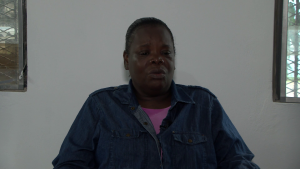
Ruth Castillo
Ruth Castillo, Coping with Grief
“It was very hard. I found myself dealing with it very hard because it was sudden. I felt lost and confused. It was very hard and I just didn’t know what to do.”
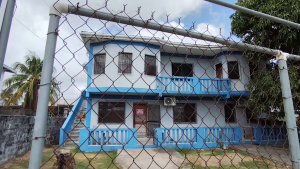 Ruth Castillo is among the many individuals who have found support through the Belize Hospice and Palliative Care Association. This non-profit organization provides holistic care that preserves dignity and enhances the quality of life for those facing serious or terminal illnesses. Frederick Gianelli S.J., the Chaplain with the association, emphasizes that their work often involves addressing grief long before the final goodbye. The organization’s compassionate approach helps individuals, and their families navigate the emotional and physical challenges of serious illness.
Ruth Castillo is among the many individuals who have found support through the Belize Hospice and Palliative Care Association. This non-profit organization provides holistic care that preserves dignity and enhances the quality of life for those facing serious or terminal illnesses. Frederick Gianelli S.J., the Chaplain with the association, emphasizes that their work often involves addressing grief long before the final goodbye. The organization’s compassionate approach helps individuals, and their families navigate the emotional and physical challenges of serious illness.
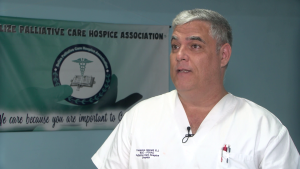
Frederico Gianelli S.J
Frederico Gianelli S.J, Chaplain, Belize Palliative and Hospice Association
“We call that anticipatory grief; the moment many people receive the diagnosis and the prognosis that it will end their life with this illness, they start to already grieve.”
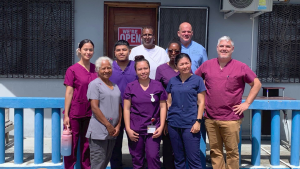 Frederick Gianelli S.J., Chaplain with the Belize Hospice and Palliative Care Association, explains the difference between palliative care and hospice care. Palliative care aims to improve the quality of life by addressing the physical, emotional, social, and spiritual needs of a person at any stage of a serious illness. On the other hand, hospice care is reserved for those nearing the end of life, typically within six months. It offers compassionate support as symptoms progress, ensuring dignity and comfort during the final stages.
Frederick Gianelli S.J., Chaplain with the Belize Hospice and Palliative Care Association, explains the difference between palliative care and hospice care. Palliative care aims to improve the quality of life by addressing the physical, emotional, social, and spiritual needs of a person at any stage of a serious illness. On the other hand, hospice care is reserved for those nearing the end of life, typically within six months. It offers compassionate support as symptoms progress, ensuring dignity and comfort during the final stages.
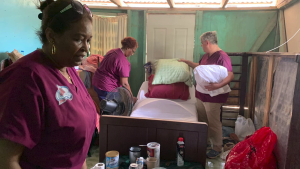 Frederico Gianelli S.J
Frederico Gianelli S.J
“Unfortunately, death is a part of life—we all will die. But how we die, where we die, and with whom we die—those are things we do have some control over. Palliative and hospice care focus on quality at the end of life. It’s about having a dignified, natural, and peaceful death. These forms of care do not accelerate the dying process, nor do they delay it. They allow the natural course of life to unfold with comfort and dignity.”
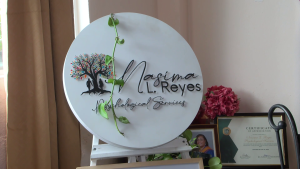 Psychologist Nasima Reyes sheds light on the complex nature of grief, explaining that while it’s often described as a process with identifiable stages, it’s rarely experienced in a straight line. People may move through different emotional states in no order, sometimes revisiting earlier feelings as they process their loss. Reyes emphasizes that how someone grieves depends on the depth of their attachment and the personal significance of what—or who—was lost. This individualized journey highlights the importance of understanding and supporting each person’s unique experience with grief.
Psychologist Nasima Reyes sheds light on the complex nature of grief, explaining that while it’s often described as a process with identifiable stages, it’s rarely experienced in a straight line. People may move through different emotional states in no order, sometimes revisiting earlier feelings as they process their loss. Reyes emphasizes that how someone grieves depends on the depth of their attachment and the personal significance of what—or who—was lost. This individualized journey highlights the importance of understanding and supporting each person’s unique experience with grief.
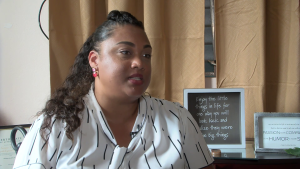
Nasima Reyes
Nasima Reyes, Psychologist
“When it comes to grief, we often talk about denial, anger, depression, bargaining, and finally acceptance. Within acceptance, it’s mainly about reaching a place where you recognize there’s nothing more you can do—it’s a form of surrender.”
Grief is deeply painful, but it also holds the potential for growth and healing. When the burden feels too heavy to carry alone, the Belize Hospice and Palliative Care Association offers a guiding hand through its bereavement group. This group provides tools, connections, and support for those learning to live with loss. Ruth Castillo, currently on her own journey of grief, shares how the support and resources from the association have helped her navigate this challenging time. Her story highlights the importance of community and compassionate care in the healing process.
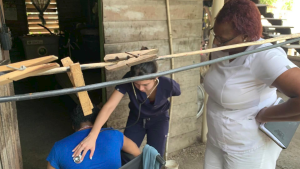 Ruth Castillo
Ruth Castillo
“Before joining the grief support group, it was a feeling of being withdrawn, crying and even feelings of anger. And after my brother passed, I got a call from the grief support group and I acknowledged that I needed that help so I went and attended the first meeting and continued. I feel that grief is something that stays with you, but with the support group, you learn to cope with it and live with it.”
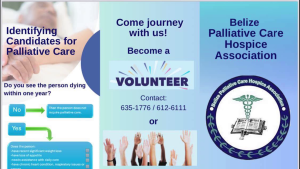 Frederico Gianelli S.J
Frederico Gianelli S.J
“In palliative care, we say the patient and their loved ones—or significant others—are a unit of care. If the patient is suffering, the family and those connected to them are suffering as well. Anticipatory grief is real for those who are accompanying someone diagnosed with an incurable, life-threatening illness and who is approaching the end of life. Sometimes we have the false idea that people only grieve when someone has died. But grief can begin long before that. For the patient—for the person who is sick—it may come from no longer being able to work, from not being the person they’ve always known themselves to be, or from losing the role they’ve played in their family. Not being able to do what once gave them meaning and purpose in life—that is also grief. Death is a moment of loss, but their life has already changed drastically, and often very suddenly. It’s a struggle—grieving the adjustment to a new normal, one that won’t return to what it once was.”
Grief is an inevitable part of life, but choosing to face it rather than avoid it can lead to personal growth, healing, and a deeper sense of peace. With the right support, grief transforms from a process of mourning into a journey toward strength and a renewed quality of life.
Frederico Gianelli S.J.
“With grief, we can go around it, or we can go through it. If we choose to go through and use the support available, we can grow as individuals. We can become stronger, and that grief—that loss—will no longer lead our lives. The fears will no longer guide our daily decisions. It becomes a time of hard work, a moment of healing, and an opportunity for deep peace and a better quality of life.”
Looking on the Bright Side, I’m Sabreena Daly.







Facebook Comments